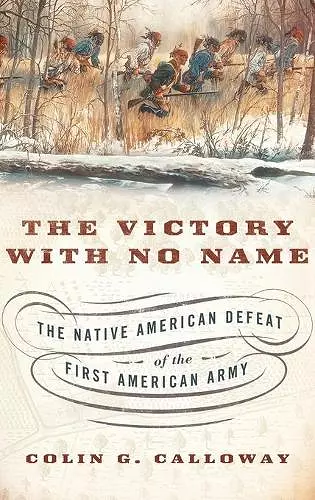The Victory with No Name
The Native American Defeat of the First American Army
Format:Hardback
Publisher:Oxford University Press Inc
Published:23rd Oct '14
Currently unavailable, and unfortunately no date known when it will be back
This hardback is available in another edition too:
- Paperback£19.49(9780190614454)

In 1791, General Arthur St. Clair led the United States army in a campaign to destroy a complex of Indian villages at the Miami River in northwestern Ohio. Almost within reach of their objective, St. Clair's 1,400 men were attacked by about one thousand Indians. The U.S. force was decimated, suffering nearly one thousand casualties in killed and wounded, while Indian casualties numbered only a few dozen. But despite the lopsided result, it wouldn't appear to carry much significance; it involved only a few thousand people, lasted less than three hours, and the outcome, which was never in doubt, was permanently reversed a mere three years later. Neither an epic struggle nor a clash that changed the course of history, the battle doesn't even have a name. Yet, as renowned Native American historian Colin Calloway demonstrates here, St. Clair's Defeat--as it came to be known-- was hugely important for its time. It was both the biggest victory the Native Americans ever won, and, proportionately, the biggest military disaster the United States had suffered. With the British in Canada waiting in the wings for the American experiment in republicanism to fail, and some regions of the West gravitating toward alliance with Spain, the defeat threatened the very existence of the infant United States. Generating a deluge of reports, correspondence, opinions, and debates in the press, it produced the first congressional investigation in American history, while ultimately changing not only the manner in which Americans viewed, raised, organized, and paid for their armies, but the very ways in which they fought their wars. Emphasizing the extent to which the battle has been overlooked in history, Calloway illustrates how this moment of great victory by American Indians became an aberration in the national story and a blank spot in the national memory. Calloway shows that St. Clair's army proved no match for the highly motivated and well-led Native American force that shattered not only the American army but the ill-founded assumption that Indians stood no chance against European methods and models of warfare. An engaging and enlightening read for American history enthusiasts and scholars alike, The Victory with No Name brings this significant moment in American history back to light.
In The Victory With No Name, Colin Calloway recounts the largely forgotten campaign that ensued in crisp, sometimes gripping prose. His account of the intertribal diplomacy and generalship that led the Indians to victory is revelatory. * Wall Street Journal *
Colin Calloway takes a largely forgotten episode, the rout of green American soldiers by Ohio Indians in 1791, and makes of it something larger and more telling. We see a grappling of two loose collections of peoples * a native coalition struggling to hold onto land and lives, and a hungry young republic in search of its identity. The story of a bloody three hours becomes one of tragedy and ascendance, full of revelations about the nation's emergence.Elliott West, author of The Last Indian War: The Nez Perce Story *
The author ably explains the winner's side of [the 1791 Battle of the Wabash, a largely forgotten clash] - a herculean task since the Native Americans had no written records. * Kirkus *
A new spin on the old adage about the winners writing history... Calloway presents keen observations on the link between business interests and the government's land policy that, underpinned by its racial assumptions, made Gen. Arthur St. Clair's 1791 defeat a complex event. * Publishers Weekly *
Colin Calloway has written a brilliant and haunting book, one that encourages us to confront entangled ironies fundamental to America's past and present. This battle 'with no name' transformed the course of American nationhood, as a devastating defeat compelled the new nation to yoke its future to conquest of Indians in the West. For Indians, a resounding victory presaged losses that were to come. In one final irony Calloway leaves us with the descendants of these Indians, people who would find an enduring place- even to this day -in the service of American arms. * Patrick Griffin, University of Notre Dame *
ISBN: 9780199387991
Dimensions: 245mm x 162mm x 24mm
Weight: 445g
224 pages